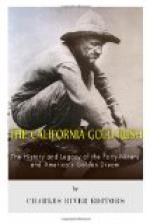In the group that surrounded him was a certain Judge Edward McGowan, a jolly, hard-drinking, noisy individual. He had been formerly a fugitive from justice. However, through the attractions of a gay life, a combination of bullying and intrigue, he had made himself a place in the new city and had at last risen to the bench. He was apparently easy to fathom, but the stream really ran deep. Some historians claim that he had furnished King the document which proved Casey an ex-convict. It is certain that now he had great influence with Casey, and that he drew him aside from the bar and talked with him some time in a low voice. Some people insist that he furnished the navy revolver with which a few moments later Casey shot King. This may be so, but every man went armed in those days, especially men of Casey’s stamp.
It is certain, however, that after his interview with McGowan, Casey took his place across the street from the Bank Exchange. There, wrapped in his cloak, he awaited King’s usual promenade home.
That for some time his intention was well known is proved by the group that little by little gathered on the opposite side of the street. It is a matter of record that a small boy passing by was commandeered and sent with a message for Peter Wrightman, a deputy sheriff. Pete, out of breath, soon joined the group. There he idled, also watching,—an official charged with the maintenance of the law of the land!
At just five o’clock King turned the corner, his head bent. He started to cross the street diagonally and had almost reached the opposite sidewalk when he was confronted by Casey who stepped forward from his place of concealment behind a wagon.
“Come on,” he said, throwing back his cloak, and immediately fired. King, who could not have known what Casey was saying, was shot through the left breast, staggered, and fell. Casey then took several steps toward his victim, looked at him closely as though to be sure he had done a good job, let down the hammer of his pistol, picked up his cloak, and started for the police-station. All he wanted now was a trial under the law.
The distance to the station-house was less than a block. Instantly at the sound of the shot his friends rose about him and guarded him to the shelter of the lock-up. But at last the public was aroused. Casey had unwittingly cut down a symbol of the better element, as well as a fearless and noble man. Someone rang the old Monumental Engine House bell—the bell that had been used to call together the Vigilantes of 1851. The news spread about the city like wildfire. An immense mob appeared to spring from nowhere.
The police officials were no fools; they recognized the quality of the approaching hurricane. The city jail was too weak a structure. It was desirable to move the prisoner at once to the county jail for safe-keeping. A carriage was brought to the entrance of an alley next the city jail; the prisoner, closely surrounded by armed men, was rushed to it; and the vehicle charged out through the crowd. The mob, as yet unorganized, recoiled instinctively before the plunging horses and the presented pistols. Before anybody could gather his wits, the equipage had disappeared.




